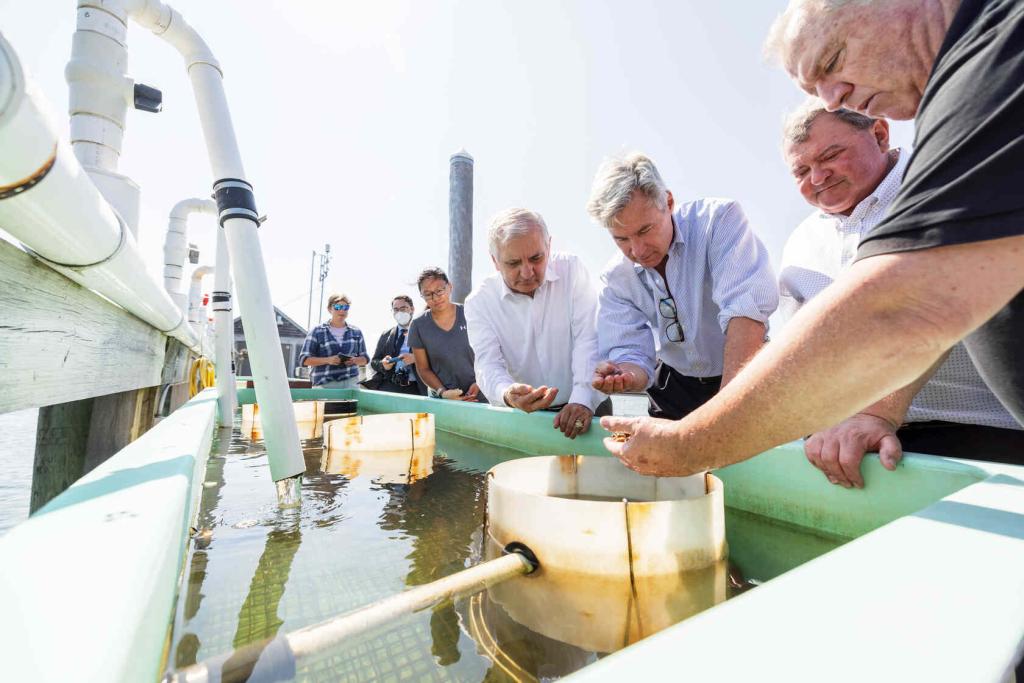Supporting Rhode Island's Aquaculture

For the Ocean State, aquaculture plays an indispensable role in the local economy. In fact, in 2022, the Coastal Resources Management Council reported that the total farm gate value of aquaculture products for consumption came in at $7,484,688. As demand for local seafood grows, aquaculture strengthens Rhode Island’s food security and supports sustainable food production.
Aquaculture is crucial for the state, but when it comes to navigating legal matters, many in the sector are left without help. At RWU Law, the Marine Affairs Institute has made it part of its mission to change this.
In August 2022, U.S. Senators Jack Reed and Sheldon Whitehouse secured a $1.6 million earmark for RWU to support shellfish aquaculture research and legal research. This funding enables the Marine Affairs Institute to provide legal research to shellfish farmers across Rhode Island and to continue its research on the regulatory and environmental challenges facing the industry.

Over the past year, the Marine Affairs Institute has focused on several groundbreaking projects in aquaculture conducted by research attorney Ryan McCrorey. With aquaculture playing an increasingly crucial role in Rhode Island’s economy and ecosystem, this research has offered insights into critical legal and regulatory issues while reflecting the university’s deep commitment to coastal sustainability and community engagement.
McCrorey, who recently completed his term as a research attorney at RWU Law, dedicated much of his time to addressing complex legal issues facing the aquaculture industry, as he helped manage real-world concerns brought forward by stakeholders in the aquaculture industry.
Addressing Marina Access and Working Waterfronts
One of the primary concerns brought to MAI’s attention by shellfish growers is the increasing demand for marina space, which pits commercial users against recreational boaters willing to pay higher prices. To help with this issue, research was conducted to explore legislative and regulatory solutions that could preserve marina access for aquaculture businesses. This research resulted in a detailed report that examined potential interventions by the Rhode Island General Assembly and the Coastal Resources Management Council (CRMC) and drew insights from Maine’s approach to preserving working waterfronts.
Promoting Local Seafood in Schools
Another key project for the Marine Affairs Institute is its effort to get more locally sourced seafood into Rhode Island’s schools. At the suggestion of Peter Wong, RWU’s Director of Research and Sponsored Programs, the legal and policy implications of increasing local seafood in school meals were explored. The Institute’s research examined federal and state regulations governing food procurement and identified recent policy changes that could make it easier for local seafood to enter the school system. This ultimately resulted in the creation of a report that examined the federal and state regulations governing food procurement for school meals, as well as an evaluation of recent policy changes that could facilitate the inclusion of more local seafood in school nutrition programs.
Expanding Aquaculture Offshore
Perhaps the most forward-looking of the past year’s research projects involved the controversial and emerging field of offshore aquaculture. While most aquaculture operations in Rhode Island are based near the coast in state waters, there is increasing interest in moving aquaculture farther offshore into federal waters. Offshore aquaculture promises to expand the industry’s capacity, but it also comes with significant legal and regulatory uncertainty.
Questions remain about which federal agencies have the authority to regulate offshore aquaculture and how existing environmental laws apply to these activities. McCrorey’s report on offshore aquaculture addressed these issues head-on. He explored the jurisdictional questions surrounding the National Marine Fisheries Service and its potential role in regulating offshore operations. Additionally, he analyzed ongoing litigation over an Army Corps of Engineers permit for offshore aquaculture, which could set important precedents for future projects.
A Collaborative Approach to Aquaculture Challenges
The success of the Marine Affairs Institute’s aquaculture projects is rooted in its strong partnerships with industry stakeholders, government agencies, and the local aquaculture community. Under Julia Wyman’s leadership, MAI continues to prioritize research that addresses real-world concerns and fosters sustainable growth in the aquaculture sector. While McCrorey’s contributions over the past year have been instrumental, they are part of a larger collaborative effort that will continue through future research attorneys and ongoing initiatives.
“It was extremely beneficial to have Ryan join team as a research attorney for the year,” said Wyman, Director of the Marine Affairs Institute & Rhode Island Sea Grant Legal Program.
“Having the ability to bring on research attorney with funding like we received from the earmark enables us to expand our capabilities as a research institute. Ryan was very quick in creating connections in the aquaculture community, meeting with them to learn about challenges with their business.”
